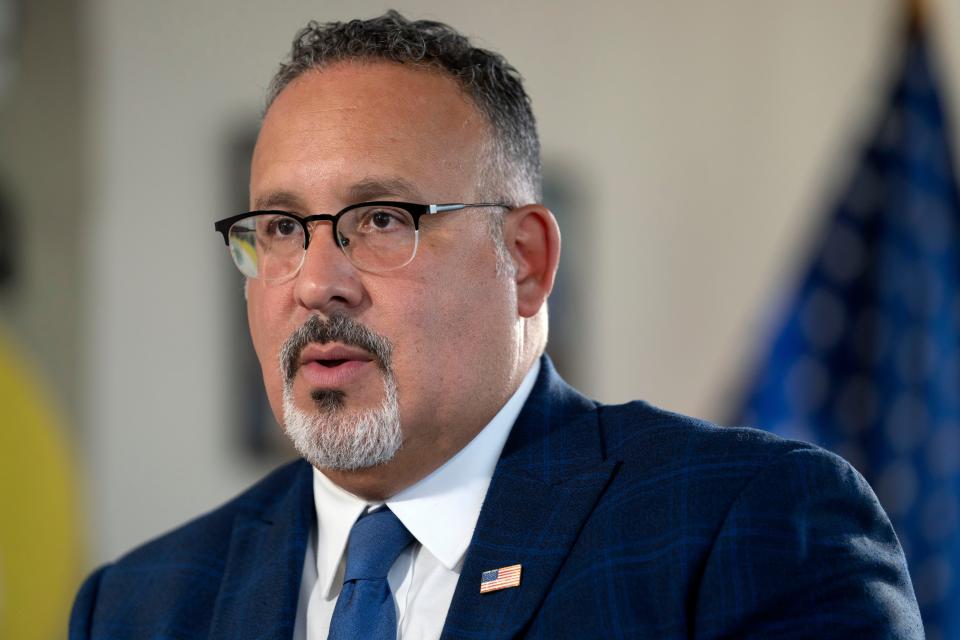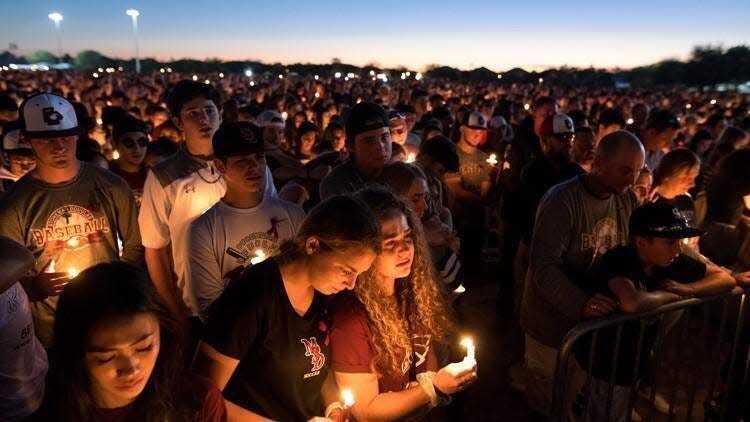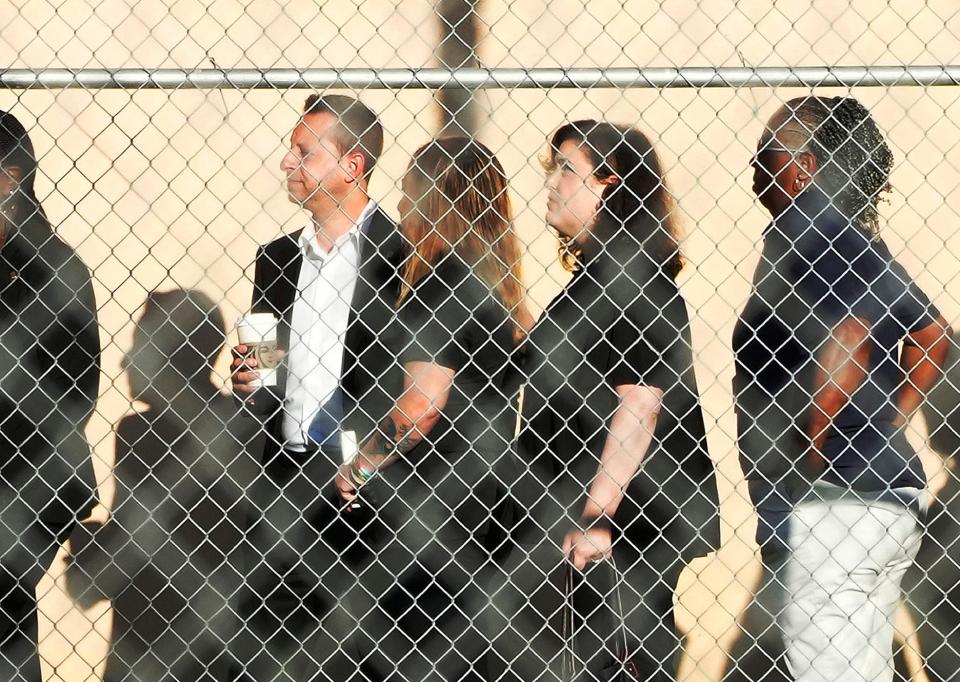Six years after Parkland: The complicated legacy of a shocking, saddening school shooting
- Oops!Something went wrong.Please try again later.
CORAL SPRINGS — The nation's top education official last month toured the abandoned school building at Marjory Stoneman Douglas High School to survey lessons and assess the complicated legacy of the horrific mass shooting six years ago this Wednesday, Feb. 14.
U.S. Education Secretary Miguel Cardona, the highest-ranking federal official to survey the scene of the carnage, said he was moved by what he saw, and by what he heard from surviving parents and spouses of the 17 students and staff members that he met with during the somber visit.
"To say that this morning was one of the more impactful experiences of my life is an understatement," Cardona said afterward at a roundtable discussion on school safety efforts. "Quite frankly, I couldn't help while walking with families through the building, I couldn't help but ask God why he wanted me here. What can I do with this experience to help protect students, and families and educators?"

He wasn't the only one. A few days later, U.S. Rep. Katherine Clark of Massachusetts, the second-highest ranking Democratic member of the U.S. House, also toured the site. And came away equally moved.
"It's a powerful reminder that gun violence in this country is a choice we are making, that we do have the ability to prevent deaths like we saw, the 17 we lost here," she said.
School mass shootings: Anger, shock, mobilization, but then 'lack of urgency' and 'normalization'
In that next hour-plus discussion, Cardona was peppered with suggestions and recommendations. To punctuate the message, the discussion was held in the very ballroom, at a Coral Springs hotel, where the survivors of the victims were told they had lost their loved ones that day.
The brainstorming included calls for automatic locking doors in classrooms, putting red flag laws in place, funding mental health needs and training school armed guards. All of which improve school safety far above what existed at the Parkland high school as students, teachers, staff and administrators arrived on Valentines' Day morning in 2018, he was repeatedly told.
Cardona also heard how the massacre that day fueled a crusade for gun-safety measures in Florida's capitol, and the March for Our Lives in Washington a month later.
But the laws ushered into place here and elsewhere also speak to the way the horror and anger at the massacre have forever altered life in schools. They also speak to the complacency, if not resistance, to additional measures in communities across Florida and the United States.
Perhaps the carelessness was shaken recently by another landmark incident. This month, Jennifer Crumbley became the first parent in the United States convicted of manslaughter in a mass shooting after a Michigan jury found her negligently culpable in the attack on a school by her son.
Still, opposition to broad school-safety efforts in other communities is rooted in the mistaken notion that such a tragedy cannot happen in their schools or neighborhoods. And in the seeming normalizing acceptance of mass shootings.

There were 656 in 2023, according to the Gun Violence Archive, in what is a uniquely American phenomenon.
"I couldn't tell you the root cause of why it's happening. I can tell you there's a host of issues," Cardona said. "There's also a lack of urgency and a normalization of this."
There is the disconnect. Six years after Parkland, there remains a nonchalance in a country in which there were far more mass shootings than days in the calendar.
Parkland shooting yielded lessons about what can be done
U.S. Rep. Jared Moskowitz, a Parkland Democrat who graduated from Marjory Stoneman Douglas High, said there are "lessons to learn about what happened in that building" that bright day.
One is that the surviving families and students rallied in a movement that rolled over Florida's gun lobby in Tallahassee by successfully advocating for a slew of firearm safety and gun-violence prevention measures known as the Marjory Stoneman Douglas School Safety Act.
"It did something in Florida that we didn't think we would accomplish just because of the politics, the nature of Tallahassee," he said.
Moskowitz, a member of the Florida House at the time, said the legislation that followed provided hundreds of millions of dollars for an assortment of programs and measures.

Those included school resource officers and armed guards as well as prioritizing psychological services in schools by providing dedicated mental health guidance counselors and coordinators.
It also raised the age to buy a firearm in Florida to 21, mandated three-day waiting periods and instituted risk-protection orders, known as red flag laws, that allow courts to remove weapons from people found to be unstable, Moskowitz said.
Parkland shooting anniversary: U.S. education secretary, top House Democrat tour Marjory Stoneman Douglas shooting site
The court orders, dubbed red flag laws, have been employed more than 12,000 times since the spring of 2018, he added. And despite initial reticence from some counties, almost every county in Florida has opted into the armed guardian program in which trained non-classroom teachers are allowed to carry firearms.
"Dozens and dozens of school safety measures that have been put in place, and six years later those laws are working," he said. "And it's because of these family members. These families have dedicated themselves to try to limit the amount of parents that end up joining the exclusive that no one wants to be a part of."
Moskowitz said the bill has been strengthened in every legislative session since 2018, although this year there is a bill to lower the age to buy a firearm back to 18.
"These families have dedicated themselves to try to limit the amount of parents that end up joining the exclusive that no one wants to be a part of," Moskowitz said.
The schoolhouse has been forever changed. Safety is the watchword, literally.
The measures aside, the roundtable analysis also made clear the shooting at a high school named after a famed Everglades defender forever changed the nature of school days well beyond just "reading, 'riting and 'rithmetic" in the tune from a century ago.
Today it's about automatic locks on doors and tinted windows for classrooms. And about coordination among school and community mental health counselors. And deepening the nexus between local and state agencies and law enforcement.
"You can't make schools safe unless everyone is coming together and looking at this holistically," said Max Schachter, who lost his son, Alex, that day. "This has to be a whole government approach. Everyone has a role to play."
Florida, Cardona was told, has a school safety officer stationed in every K-12 campus every day. And still, more is yet to be done.
Tony Montalto, an airline pilot whose daughter, Gina, was killed at the high school, drew an analogy to the hardening of security at airports and aircraft after the Sept. 11 attacks.
He pointed out the assailant fired at his victims through glass windows. He called for protective measures like tinted windows and doors to lock automatically in the same way sprinklers spray water at the first sign of smoke.
"We need to build and retrofit our schools to protect our children and our teachers from the threats they face today," he said.
And while armed guardians have now been assigned, it's up to everyone working in a school — janitors, bus drivers, media-center specialists — to know how to spot and report the signs of trouble in a student, Montalto added.
A school psychologist who spoke added that programs to address students stressed and in distress are needed but that school counselors and those treating youths in the community also need to communicate with each other.
Debbi Hixon, whose husband, Chris, died in a heroic effort to disarm the shooter that day, acknowledged "there's a lot of things in place" to help but more awareness of those opportunities is necessary. She suggested a marketing campaign or public service announcements to bolster the use of the resources available to schools and communities.
And she said, there is no room for anything other than "urgency" at all times.
"People may take this the wrong way but if you say, 'It didn't happen to me,' you just don't understand the urgency," Hixon said. "And you say, 'It can't happen to us,' but it keeps happening everywhere."
The elephant in the classroom: The lethal weapon of war
The discussion steered away from gun-control measures, an issue Moskowitz had said in an interview in December that he saw no chance of moving through a polarized, paralyzed Congress in the 2024 election year. To be sure, this month an immigration bill negotiated by a conservative Republican in the U.S. Senate was torpedoed by his GOP colleagues in the chamber and the U.S. House.
But gun accessibility did come up nonetheless. Fred Guttenberg, whose daughter, Jaime, was among the 17, said the reality remains that "too many kids and others who intend harm are getting easy access to guns and ammunition."
Cardona said he understood and spoke to the frustration with the inability to keep the hundreds of millions of weapons circulating away from the hands of those who should not have access to them. Particularly, he said, the availability of "assault weapons made for war."
He pointed out that the lethality of AR-15s and other assault weapons makes possible the carnage that has occurred in Parkland, Uvalde, Texas and Newtown, Connecticut. At Marjory Stoneman Douglas High School, he said, the attack lasted a mere three and one-half minutes, or 210 seconds.
"We've seen countless times the best-laid plans are thwarted with an AR-15," Cardona said flatly. "And yet we expect different results."
Cardona said he understood the realities on Capitol Hill but added that is all the more reason why people must speak out forcefully and incessantly.
"We need to address the complacency. What else will it take for us to move?" he said. "If children dying is not enough, what will it take for us to move?"
Antonio Fins is a politics and business editor at The Palm Beach Post, part of the USA TODAY Florida Network. You can reach him at afins@pbpost.com. Help support our journalism. Subscribe today.
"
This article originally appeared on Palm Beach Post: Legacy of mass shooting at Marjory Stoneman Douglas High School complex

